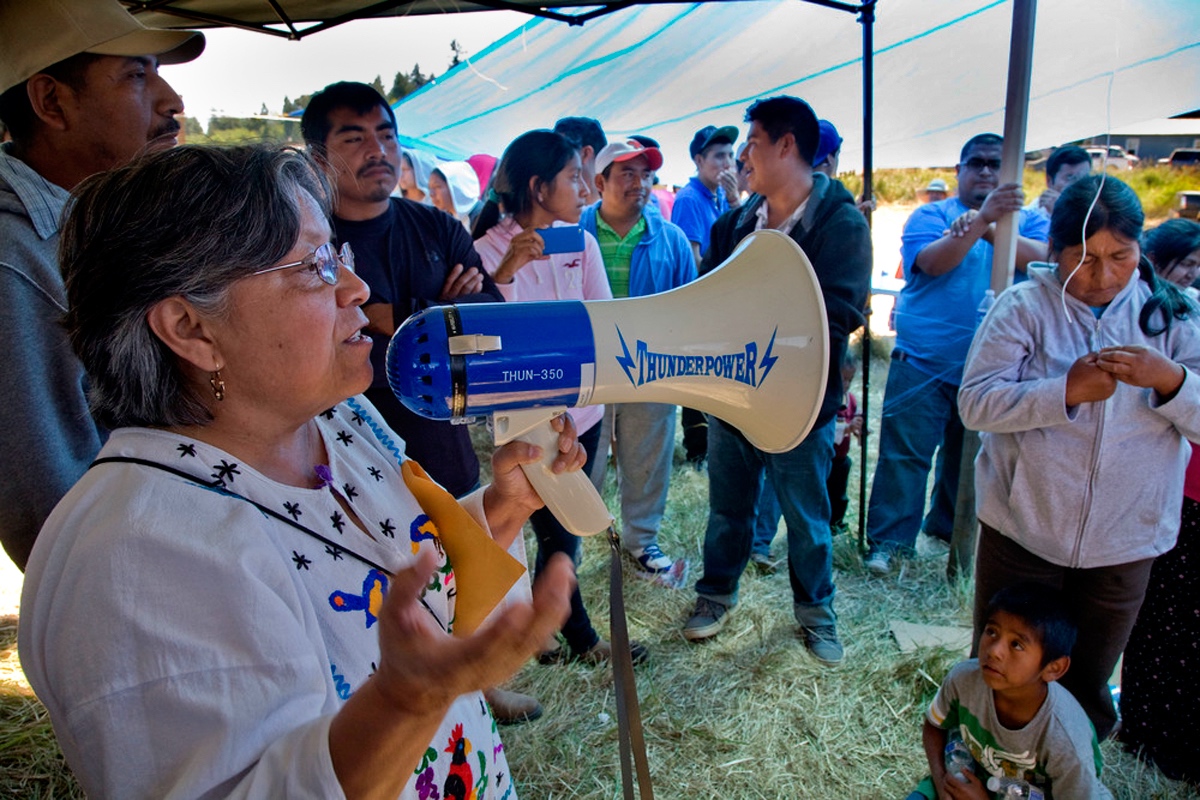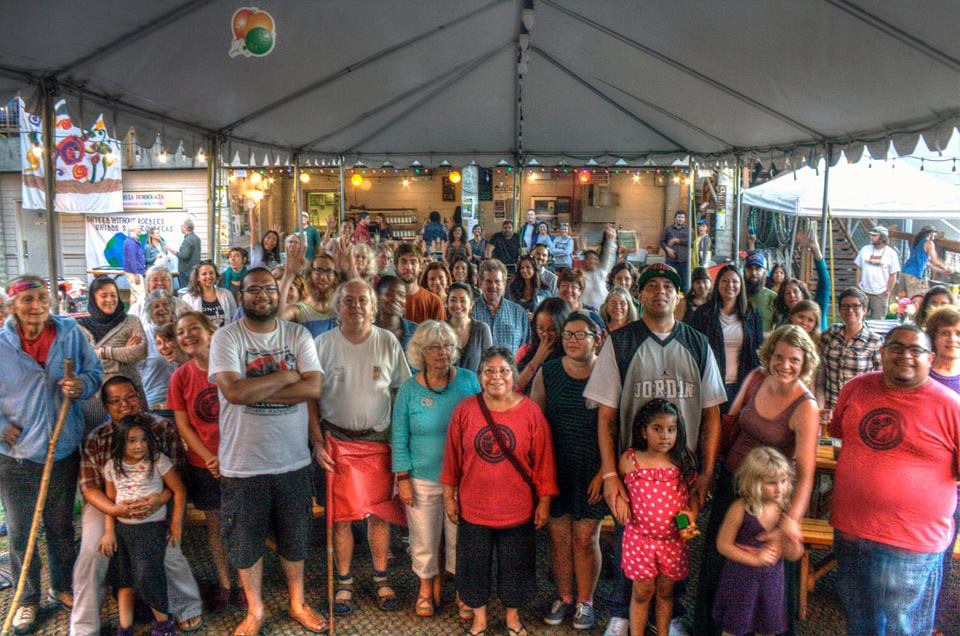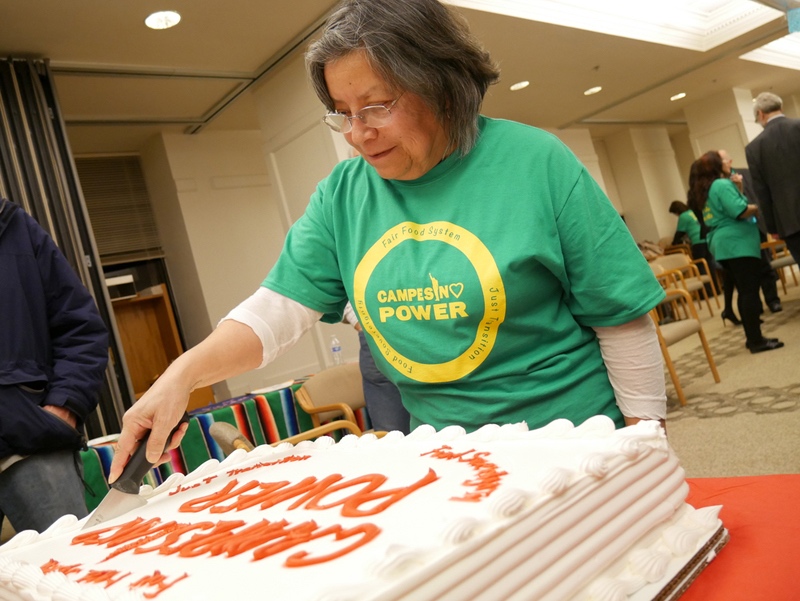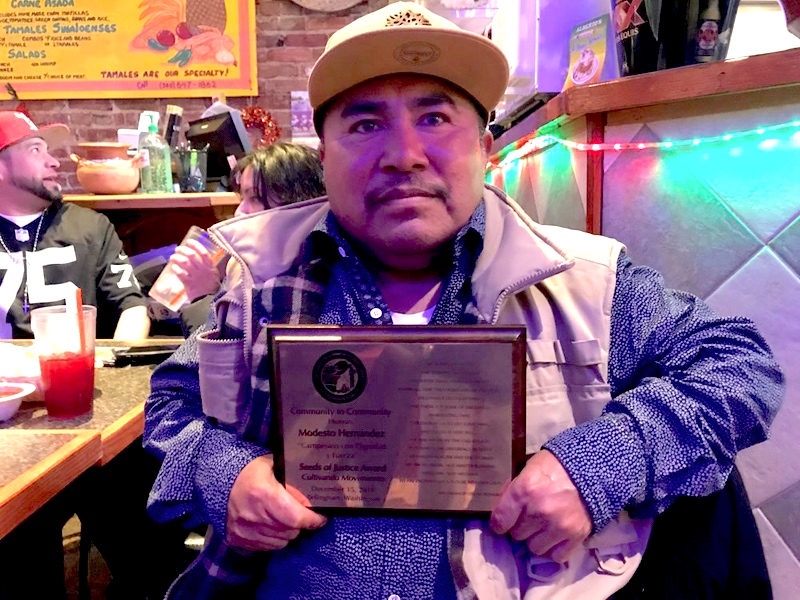
Rosalinda Guillen: A Force for Farmworker Justice
My profile of organizer and farmworker justice activist Rosalinda Guillen of Community to Community Development for Civil Eats.
A ferocious organizer and labor activist for more than 30 years, Guillen founded Community to Community Development in Washington, a group led by women of color fighting for better farm-working conditions.
The phone rang at the grassroots food justice organization in Rosalinda Guillen’s office at Community to Community Development (C2C) in Bellingham, Washington, in August 2017. The person on the line said a group of 70 farmworkers was walking down the road leading away from Sarbanand Farms, a large, corporate-owned blueberry farm in the area.

Farmworker justice leader Rosalinda Guillen, the executive director of C2C, soon arrived on site with her staff to find that the men had been fired for complaining about mistreatment after the death of one of their fellow workers, 28-year-old Honesto Silva Ibarra. Silva Ibarra had died of dehydration from being forced to work 12- to 14-hour days in the hot, smoky conditions caused by fires that were sweeping through the region that summer.
Because the men had been fired, they had lost their visa status and would be considered undocumented. C2C immediately set up an encampment for the men and put out the word to the local community.
“We had an amazing outpouring of support,” Guillen said. “People brought money, food, tents, chairs, sleeping bags. Doctors and nurses volunteered to check the workers out. They appeared with cars and vans to drive them to the clinic, to the hospitals.”
A ferocious organizer and labor activist for more than 30 years, Guillen, now 68, founded C2C as an organization led by women of color, a place-based, grassroots organization committed to strengthen local and global movements toward social, economic, and environmental justice.

In 1995, Guillen won the first-ever farmworkers’ collective bargaining agreement in the state of Washington with Chateau Ste. Michelle Winery after helping to organize its workers and after an eight-year boycott of its wines. Previously, she organized strawberry workers for the United Farm Workers (UFW) in California, eventually serving as political and legislative vice president of the union’s executive board.
“I’ve always appreciated that Rosalinda can speak to the nuances and complexities of a just agriculture system, knowing that not everyone sees the same path forward,” said Kerstin Lindgren, a strategic organizing researcher at Service Employees International Union (SEIU). “But [she] doesn’t lose sight of a vision for justice that is more broadly shared.”
In the case of the terminated blueberry pickers, C2C helped educate the community about what had happened by using live feeds on Facebook and protests at state agencies. It held community forums where the farmworkers testified about their experience, medical workers talked about what extreme dehydration looks like, and staff from farmworker justice organizations explained the H-2A program—a visa allowing a foreign national to enter the U.S. for temporary or seasonal agricultural work.
“People saw it—they saw what happened,” Guillen said.
The attention enabled C2C and a coalition of other organizations to introduce Senate Bill 5438 in the Washington legislature, which would create a state Office of H-2A Compliance and Farm Labor to provide oversight and monitoring of the H-2A program in the state. The bill passed in May and will take effect at the end of July.
“Community to Community has made my life real,” said Modesto Hernandez, a farmworker and member of C2C, who had suffered devastating personal injury, losing his feet to frostbite from unsafe working conditions, as well as experiencing discrimination. “Without their support I would not be able to think positively about my future. Now I know that I have the ability to take care of myself, I don’t need charity—I need fairness, and C2C has shown me how to raise my voice and get people and agencies to be fair.”
Destiny Comes Knocking
Guillen and her seven siblings grew up living in migrant labor camps following her father, a farmworker from Mexico, on the migrant circuit around the United States. Despite this fact, at the age of 37, Rosalinda Guillen had never heard of Cesar Chavez.

But on the day Anne Atkeson, a recruiter for the Jesse Jackson’s 1988 presidential campaign, knocked on Guillen’s door in rural Whatcom County, Washington, Guillen was living on a chicken ranch with three sons while working as the manager of data processing at Skagit State Bank. It was the third time that Atkeson had appeared on Guillen’s doorstep, desperate to find a person of color to help with local organizing for Jackson’s campaign.
“I honestly was not even registered to vote at the time,” Guillen said. But something about Atkeson’s persistence made Guillen invite her in. “I figured I’d let her talk 15 minutes, then she can leave and leave me alone.”
“But the minute [Atkeson] said, ‘What do you think about the United States having a Black president in the White House?’ those words were like a whip or something,” she recalled. “I looked at her and I said, ‘What are you talking about?’”
The idea of a Black president resonated with Guillen, she said, because for her and many others, being a farmworker in virtually all-white rural Washington meant being treated as a second-class citizen as well as experiencing outright racism, unequal treatment, and disrespect.
She registered to vote and started going to campaign meetings, eventually running for—and winning—election as a precinct committee officer where she brought in the rural Democratic Party Caucus for Jesse Jackson.
“I loved it,” Guillen said of her work registering voters and distributing literature. “It was so invigorating talking about democracy and the Constitution and racism and Jesse Jackson and opportunities for people of color. I didn’t know this world existed. I was infused with a whole new identity. That’s where I learned about Cesar Chavez and the farm worker movement.”
"What Would Cesar Do?"
Guillen founded a Whatcom County chapter of the National Rainbow Coalition, which had grown out of the Jackson campaign, where she worked on several local electoral campaigns. When she heard of the death of Chavez in 1993, Guillen quit her job at the bank and went to work full time for the coalition. It was there that she was approached by farmworkers at Chateau Ste. Michelle winery, the largest winery in the state of Washington, who wanted the coalition’s help in supporting their boycott of the winery.
Through that campaign, she met Joseph Moore, a Vietnam War veteran and antiwar activist who taught her to view organizing through a strategic, nonviolent lens, using direct action and campaigns to change structures and systems. Guillen and Moore eventually married.
The Rainbow Coalition chapter signed a collective bargaining agreement in December 1995, the first-ever union agreement with that winery in Washington. But because the Rainbow Coalition was not a bonafide union, Guillen and her partners approached the United Farmworkers of America (UFW), whose leadership was dumbfounded that a local coalition could pull off such a sweeping and historic agreement.
“They didn’t believe us. And because they’re organizers, they asked, where’s the list? What’s your leadership, what’s your base, how did you do it?” she said. “I pulled out the book, Conquering Goliath [by Fred Ross] and the book [Cesar Chavez: Autobiography Of La Causa] by Jacques Levy. We had them in the office and many, many times, we would go to those two books to say, ‘Okay, what would Cesar do in this situation?’”
To expand her work, Guillen in 1999 moved to Sacramento, California, to work with the UFW. As vice president of the UFW board, Guillen worked to successfully amend the California Agricultural Labor Relations (CALR) Act to impose binding arbitration and mediation on unions and employers if an impasse was declared, since a number of impasses in collective bargaining had occurred since CALR had first been enacted. It was the first time the Act had been amended since it was written and passed in 1975, which former Governor Gray Davis then signed into law in 2002.
She became increasingly devoted to the ideals that Chavez stood for. “I[felt like I] talked to him on a daily basis about how do we move forward,” Guillen said of her constantly referencing Chavez’s books and speeches, as well as the people who had worked with the labor leader. “What are the challenges? What would he do in this changing political climate? How are we as farmworkers going to be at the decision-making table and be seen as an equal stakeholder in the production of food?”
“We are the ones on the ground. We are the ones that know our truth. And we are the ones that know what needs to happen,” she continued, describing Chavez’s fight against pesticides in large-scale agriculture. “It’s like we’re the canaries in the mine. You’re putting us in a position where we’re dying, and then you’re going to die next.”
Guillen believes strongly that as stakeholders, farmworkers need to be involved in any decision-making that has to do with the food production. “We can’t just be tools,” she said. “We can’t just be another resource that’s owned by the agricultural industry to make more profit. We are people.”
Guillen’s trip to Porto Alegre, Brazil, in 2000 to present at the World Social Forum (WSF) on behalf of the UFW on the conditions of farm workers was, for her, life-changing. She was astounded by the dynamism she saw in the landless workers’ movement as well as the model of a participatory democracy in the People’s Movement Assemblies—developed as a decision-making space of the WSF. Additionally, the efforts to build policy from the bottom up were real-world examples of the ideas she had been formulating. She couldn’t wait to get back and, as a member of their governing board of the UFW, introduce those models to the union.
Unfortunately, Guillen said the union wasn’t interested.
Community to Community
Disheartened, and concerned that the growth of industrial agriculture in California would soon migrate north to Washington, she decided to leave the union and return home to Whatcom County. There, in 2004, she opened C2C to build on the work of Chavez and establish a real-world model of the values of collective action she learned at the WSF.
“The whole point of Community to Community is to plant seeds, to grow little plants of leadership and let them flourish,” Guillen said, based around a structure she calls ecofeminism, empowering the feminine in both men and women, and by partnering with Mother Nature herself.
At C2C, women make the decisions and men support and give input. C2C has been instrumental in voter registration and education drives in the local farmworker community, particularly focusing on women, and has partnered with Agricultural Justice Project (AJP) to promote fair trade in agricultural production by developing a Food Justice Certified label so shoppers can easily see that a food product has not exploited workers or the land.
It also means putting the means of production into the hands of farmworkers through the establishment of worker-owned co-ops, which own and work the land and sell the harvest. The first, established in 2017, is Tierra y Libertad (“land and liberty”), currently farming 65 acres in Whatcom County and producing its first commercial harvest this year.
“Without land we cannot fully achieve all our dreams,” said Ramon Torres, President of Familias Unidas por la Justicia, an independent farmworker union led by indigenous families. “These berries are proof of our skills to grow our own food. We want to be able to sustain ourselves economically—we do not need bosses, just each other working together.”
“The legacy of injustice in agriculture and the complexity of solutions is definitely a challenge,” said SEIU’s Lindgren. “But C2C has had an impact locally in very concrete ways—and more broadly by creating connections and bridges, sharing knowledge, getting people involved in the movement in meaningful ways, and being an inspiration.”
Lindgren added that she is struck by Guillen’s “sense of justice and her confident determination that we could have an organization that modeled what we wanted our agriculture system to look like—that is, an organization where farmers, farmworkers, businesses, retailers, and other stakeholders all came together equally, through both formal and informal channels.”
Now at almost 70, Guillen is starting to reflect not only on her legacy but on the future of C2C and its place in the overall story of the farmworkers who have built our agricultural system.
“My goal is to have a team that is led by farmworkers and hand them the structure that we built, and let them run with it,” she said. “Because we don’t know what the future brings. We don’t know the shifting political changes. All we can do is be nimble, to be consistent in our values and our principles and to try to do the best that we can.”
“The ultimate goal is that people be able to eat goodness,” Guillen said, referring to food that is healthy for the people who grow, harvest, and eat it, as well as for their communities and for the planet as a whole. “Your plate of food in front of you is a reflection of what’s going on in your community.”